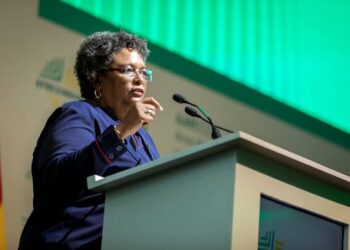Agricultural production in Liberia is primarily based on rain-fed farming, which is dependent on the April-November rainy season. Over 80% of Liberia’s 4.5 million population relies on small-scale subsistence farming, with rice serving as the staple crop. For centuries, Ttraditional shifting cultivation which requires both heavy rainfall and sunlight has been the predominant farming method in the West African country.
Climate change presents challenges for Liberia as the country is particularly vulnerable to climate change. Like many other countries in Africa, Liberia is already grappling with environmental issues and sustainable development challenges. Due to its geographical location Liberia is highly susceptible to extreme weather events, the coastal impacts of rising sea levels, and disruptions in water systems and availability.
Climate change also poses a serious threat to Liberia’s emerging development priorities. In agriculture, major climate-related risks are linked to changes in rainfall pattern and increased rainfall during critical periods of the growing season, which can lead to reduced crop yields.
FAO Country Programming Framework for Republic of Liberia 2016- 2019, revealed that the country has initiated several policy frameworks to impact the agricultural sector with the aim of revitalizing agricultural activities to contribute to inclusive and sustainable economic development and growth, and to provide food and nutrition security, and employment. The objective of the project was to promote technological options for farmers that would increase productivity and farmers’ resilience to the negative impacts of climate-related changes.
Liberia’s Ministry of Agriculture has acknowledged that rising temperatures and water shortages, exacerbated by climate change, could worsen farming conditions. Alvin Wesseh, the Assistant Minister for Regional Development Research and Extension at the Ministry of Agriculture said the ‘dry season” in Liberia has become longer than the raining season over a couple of years and this has caused shortage of water supply to Agricultural areas in Liberia thus leading to low productivity. Temperature, he said “It is one of the most troubling factors affecting low crop yield in the sector”.
This increase in temperature could, according to him, lead to sea level rise that might probably cause deaths of plant species. Wesseh did not mention what the Ministry of Agriculture and its partners are doing to address the challenges caused by climate variability and extremes in the agriculture sector.
Halala Willie Kokulo is the Director for the Division of Land Development and Water Resources at the Ministry of Agriculture. A graduate of the University of Liberia with a BSc in General Agriculture, and an MSc in Integrated Watershed Management, Makerere University, Kampala, Uganda, he serves as the principal technical focal poison for land and water resource management.
Kokulo is concerned that disturbances in weather pattern will lead to increased encroachment on shallow swamps and wetlands, which could result in low production and distribution shortages.
“You need to have enough or surplus in a locality before thinking of transporting for distribution to another location. Less rainfall is a serious production challenge to a country like Liberia that doesn’t have a good Agriculture irrigation and water management (water harvesting) systems,” says Kokulo.
He added: “Yes, we are heading to such a production crisis if we do not put the proper mechanism into place considering water as a natural resource like forest and other minerals, we will certainly lead to such.”
The technician further said: “Global warming situation in countries with poor water management programs,” he argues “will suffer serious decrease in food production.” Liberia is yet to submit Nationally Appropriate Mitigation Actions for Agriculture
The United Nations Food and Agriculture Liberia office (FAO) states that while the Government of Liberia has developed several policies on agriculture, food security and nutrition, it lacks the political will, resources and capacity (institution and human) to ensure implementation of sustainable agriculture policies and programs.
According to the FAO, there is no communication strategy for the sector, along with other related issues such as policy support, advocacy, and dialogue. Currently, the FAO is supporting the development of the country’s National Agriculture Investment Plan (NAIP) .National Agriculture Investment Plan (NAIP) 2024-2030.
“Liberia is yet to fulfil its requirement following the negotiations under the “Bali Action Plan’, which concluded at COP 18 in Doha. Under this agreement, developing countries like Liberia are expected to implement Nationally Appropriate Mitigation Actions (NAMAs) in the context of sustainable agricultural development, aiming at mitigate the climate impact on the food chain,” the United Nations Food and Agriculture Liberia office told journalists in 2022.
It added that, since December 2012, Liberia has yet to submit its NAMAs. In contrast, countries like Ghana, Gabon, Madagascar and Gambia have submitted policies aimed at transformational change within the agriculture sector, or actions across multiple sectors for a broader national focus.
Madam Jennie Cooper, former agriculture minister, said climate change is wreaking environmental havoc worldwide, adding that poor countries like Liberia which have limited financial and technical capacity to adapt or mitigate face significant challenges. She said, rice production is becoming low, with many Liberians turning to imported rice. The situation is increasing hardship for citizens.
According to AfricaRice, annual per capita consumption of rice (about 133 kg per year) in the country is amongst the highest in Africa. To meet the high demand, Liberia imports nearly 300,000 metric tons annually, costing an estimated US$ 200 million.
Gbedin, also known as Gbedin Rice Station or Gbedin Station, is a village and agricultural hub located in Sanniquellie-Mahn District, Nimba County, in northeastern Liberia, near the Guinean border, situated halfway between Ganta and Sanniquellie. The area is known for its rice station and the United States Department of Agriculture-supported resettlement program, the Gbedin Project, which began in the 1950s, is aimed to settle farmers on the land and organise them into semi-cooperative groups.
Farmers in Gbedin in Nimba County have been expressing concerns over low yield in rice due to climate change in recent years. In addition, they have highlighted a lack of adequate farming implements, which hinders their ability to increase productivity and improve harvests.
“The agricultural calendar of crops has been affected here in the community, due to gradual climatic change impact. Changes in the climate have been a limiting factor on rice crops production throughout the year. Due to this impact, farmers in Gbedin are more concerned with the production of rice,” George Leaman, head of Dokodan Farmers’ Cooperative in Gbedin said. Leamon said many farmers in the community are discouraged because of the low yields in the last two farming seasons as compared to previous years.
“We are getting tired of planting rice because we are no longer our harvests are not encouraging. As result, our farming group has drastically reduced in membership,” he pointed out.
It is a surprisingly hot and sunny evening of July 30, 2023, in Gbedin as Saye Paye, with 15 dependents, sits idly. It is surprising because such weather has not been experienced in July in Liberia before.
Worrying over how to feed his family, Saye says life has become unbearable in the community in recent years because climate change continues to negatively affect rice production. As a result, he says, “High yields of rice in Gbedin attracted me and I brought my family here in 1996 from my home town. Pledeyee.” Life was fine for Saye and family until beginning 2015 when climate caused lower yields of rice planted by his farmer group.
“Now after harvest season, we no longer have food for three months and the only option is to purchase imported rice. I am forced to buy cups of rice every day to feed by family, which is a seriously financial burden for me,” Saye indicates. Saye is thinking of moving with his family to another location in search of different economic activities to sustain his family, adding that this area is only good for farming activities that are affected by climate change. Similarly, Kpatawee Rice production site in Liberia’s central region of Bong County is losing workers and as well affecting economic activities in the community.
Farmers in Kpatawee claim that rice production in early years was good, and with high yield output at harvest, which have changed over the years leaving the majority of them confused about the appropriate time to engage the soil for rice productivity.
According to Agriculture researcher Johnson Davis, the few farmers that are engaged in agricultural productivities have less interest in the production of rice, which has claimed the attention of the government.
However, Chinese rice experts have been running an irrigation agriculture project at Gbedin. The Chinese rice techniques are now being introduced in other parts of Liberia. A cooperative of six farmers each with five acres of land has been organized at Ghedin and has received training from the Chinese experts.
The suitability of the swamp for rice cultivation has prompted the government to solicit technical assistance to introduce modern agricultural methods to local rice farmers in order to discourage shifting cultivation. The site is currently used for subsistence farming (rice).
In Liberia, investment in Agriculture Rice Value Chain is one of the most effective ways to end hunger, improve nutrition, and drive economic growth and development in the country. This can only be done if Ministry of Agriculture and partners work together in mitigating effects of climate change on rice production in Liberia. I believe the China-Africa Relationship and Climate Crisis can intervene. Johnson Katiama, an agriculture student at the University of Liberia, says China can help train Liberian farmers in sustainable land management to grow rice.










Discussion about this post